

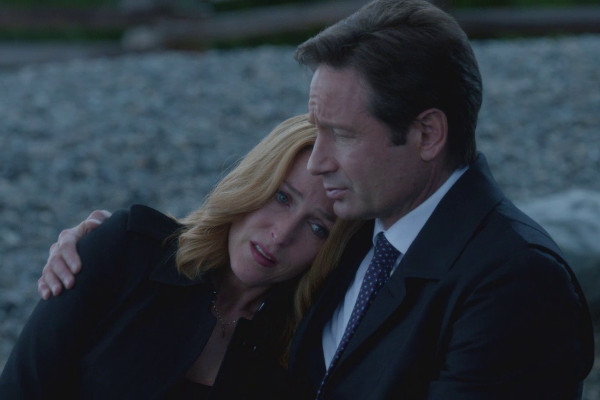
Would the mini series be able to recapture the magic that made the original show so compelling? Would it justify its return after 14 years off air? Join me as I cast an eye over the six new episodes to find out, ranking them from worst to best. Just one word of warning... as this is an adult series, some of the images below may contain graphic elements that are unsuitable for younger readers.
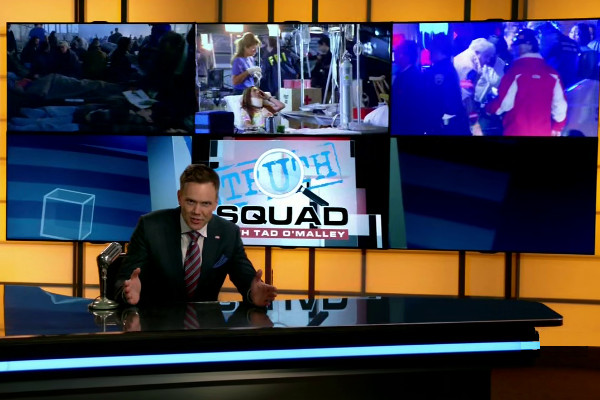
"This was our mistake."
Since the original series ended in 2002, the mythology episodes have gotten a bad rep by reviewers conducting retrospectives. There was certainly a point where the conspiracy arc reached beyond its natural lifespan, but with nine years on the air, it required extending to keep the momentum going. While the details of the arc became confused and confusing (bees? Alien invasion of the world in 2012?), it's perhaps forgotten that it was the same mythology that originally made the show so gripping, and that the "monster of the week" episodes were comparatively inessential. The X-Files was made to be watched on a week by week basis, and it was the slow drip feed of information about shadowy government practises that gave it its lifeline.
That the "mythology" eventually went round in circles and lacks rewatch value in DVD boxsets is not entirely the fault of the initial format. There are also less of them than you may recall, too – not even 80 of the mammoth 201 episodes, or less than 40% of the output. The mini season then has a tough job to do, in that in order to resurrect The X-Files, it requires a conspiracy arc that can reopen the investigation unit... but in full knowledge that the general viewership no longer really cares.
As the season finale, then My Struggle II takes the series to previously-unreached heights of ludicrousy. As the main featured character, Gillian Anderson runs through the script with breakneck urgency, seemingly in the belief that if it goes quick enough, no one will notice how implausible and silly the entire thing has got. With an overnight epidemic, the Cigarette Smoking Man (last seen blown to pieces in the original series finale) going way beyond parody and the alien conspiracy reaching ever-more ridiculous levels, maybe it's best just to forget it all and ask yourself why Mulder doesn't have a password on his laptop. Series creator Chris Carter, always one of the clunkier writers, here mines new depths, with so many awful lines of dialogue that it's impossible to choose a lowlight. That said, credit must be given to William B Davis for keeping a straight face when he has to utter the preposterous "You speak to me of Hell? When you look to be the one who's Hellbound."
The tonal inconsistency of Babylon is brought back here, with Einstein and Miller – introduced in the prior episode as two-dimensional comedy characters – now serious agents heavily involved in the plot. Rumours abound that they're being primed to take over, should Duchovny and Anderson not be available, and that would certainly be an option, especially as this episode brings back Monica Reyes and character assassinates her. As the finale of the mini season, this was an extremely poor note to bow out on, its sole saving grace being a genuinely good cliffhanger.
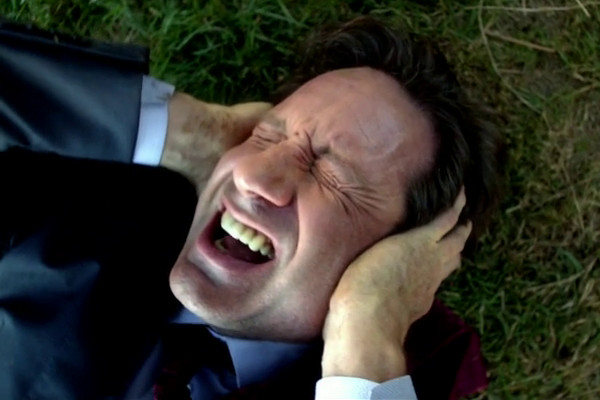
"I'm old school, Mulder... pre-Google."
James Wong was, with co-writer Glen Morgan, behind some of the series' most notable highs in the original run: fifteen scripts which included Home, both Eugene Tooms episodes, Ice, Beyond The Sea and the creation of the Lone Gunmen. Sadly, while serviceable television, this solo episode by Wong doesn't really go anywhere new, and does feel like we've seen it all before. In fact, in rigidly trying to keep the same X-Files vibe that the original series possessed, it's often as if the new episodes haven't moved on since the 90s, even down to the not-updated title sequence, which still shows the stars looking like they did over twenty years ago.
This insistence on not growing with the times gives us now humorously unfashionable flashback/fantasy sequences, and corny lines such as "All we can do Scully is pull the thread... see what unravels." Perhaps most shocking is that, despite having a reasonable budget, it's still so cheap that there are two startlingly obvious stunt doubles for Duchovny. The X-Files was often an excellent programme, but very much of its time. In order to survive in the modern age, it needs to prove that it exists there.
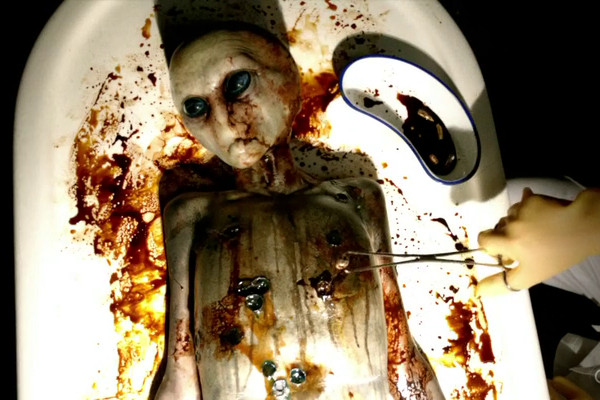
"This is old news."
TV viewing habits and platforms have greatly altered since The X-Files was last on air, and the programme will never be able to fully recapture its heyday. The episodes broadcast in the mini season's regular Monday 8pm timeslot all had viewing figures lower than any episode from seasons 2-8, and the figures fell each week, from 9.67 million for Founder's Mutation down to 7.07 for Babylon, with just a slight rise for the finale at 7.57m.
The sole exception to the still-reasonable viewing figures was this premier episode, screened on a Sunday evening and boosted from airing after the NFC. Reaching 16.9 million viewers, a figure which expanded to over 21 million when streaming and recording were taken into account, it was an unqualified commercial success. Sadly, it received mixed reviews, though is perhaps better than given credit... but the crude attempts to graft the intervening 14 years of history onto the series' continuing plotlines don't quite come off, and make the series look directionless.
Thankfully, the continued fortunes of the series have been based most strongly on the 18-49 demographic, a target audience who have responded well to the series' revival. Despite the sheer number of viewers abandoning the series, the most market-friendly audience have largely stuck with it, causing Fox executives to declare interest in further seasons.
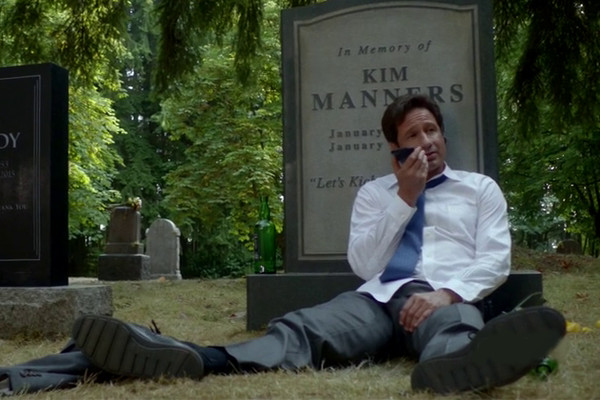
"It's just... silly."
While The X-Files was far from the first television series to attempt post-modern and comedic episodes, it was something that wasn't particularly fashionable at the time, and has come back into favour since. In today's TV climate, it often seems like there's not a single programme on air that isn't parodying its own form, from standard dramas down to the disappointingly self-aware new version of Doctor Who. However, it would be stretching it to give credit for this to The X-Files. When it had its first comedy episode in 1995 (Darin Morgan's Humbug) it was fairly new and fresh, but it was the constantly self-deconstructing Buffy The Vampire Slayer from '97 on that led to such a proliferation of television that doesn't dare to take itself seriously.
So the question must be asked: is what was relatively unique in the mid-90s now passé in 2016? There's certainly the continuing feeling that the characters have all been placed into some kind of isolation since the early 2000s, with Scully oddly curious as to why Mulder is using his phone to take photographs, something that to the rest of us is a fairly everyday occurrence.
While Morgan's episodes were atypical (something that stands out more in a shorter season, where "offbeat" now equals a sixth of the run) they were also some of the best and most literate scripts the series had to offer. What's surprising is that Morgan didn't go on to greater success... while he won an Emmy for "Outstanding Writing", he rarely worked on scripts after he left The X-Files, and went into production. Mulder & Scully Meet the Were-Monster is just his twelfth script for television over a twenty-year period. It's perhaps sad to report that, while containing some amusing moments, and some engaging ruminations on life, death and middle-aged disillusionment, it's his weakest script for the programme, prone to overt silliness in place of his trademark wit.
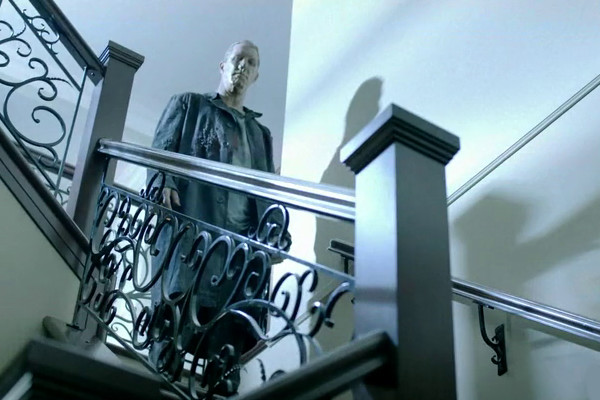
"Scully, 'back in the day' is now."
Despite the title, this is not a sequel to the very memorable episode Home, though does echo that instalment's sense of style by having a form of golem carry out a murder to the sound of Petula Clark's "Downtown". In an interview with the Guardian, David Duchovny had doubts the show had the same energy upon its return, questioning "it was hard for me to try to figure out how to drive the show without being the guy who's driving the show. I'm not sure if I succeeded." Although the central conceit here might seem a little hokey in 2016, Glen Morgan succeeds in restoring some of the missing energy, both in his dialogue (Mulder has some nice quips of old, including one about a recycling bin) and in his first X-Files gig as a director. Before the mini series, The X-Files had been the work of just 44 directors, including the two stars. However, the mini series features every writer directing their own scripts, a first in the case of Glen Morgan and his younger brother Darin. Although they'd directed before (Glen the feature film remakes Willard and Black Christmas), the mini series was the first X-File for both of them.
Sadly, the energy does start to flag during the subplot regarding Scully's mother and her continual guilt over giving their son up for adoption... a somewhat maudlin yet necessary attempt to tie the episode to the main series arc. The Mulder and Scully of the present age are not the carefree agents of the original series, but (as with the okay-but-forgettable second movie) a pair of emotionally damaged, weary individuals. It doesn't really provide the show with the kick it desperately needs to make it stand out in a TV landscape that's far more diverse and crowded with genre TV than the era it came from, but on the strength of this episode, it may just have a chance. One last thing... Gillian Anderson wore a wig for her role as Scully, rather than risk damaging her hair with multiple dye jobs for various screen roles over a short period. This is probably the most obvious here, where it's required to move against various objects, not least the mobile phone she frequently places against the immovable syrup.

"You think anyone takes The X-Files seriously?"
Likely to be the most contentious and divisive episode of the season, while this one ranks highly due to making the series relevant again, there's a very real case to be made that it should rank far lower, and is, in many senses, one of the worst episodes of all.
Allegations of both Islamophobia and misogyny have been touted against the instalment, but neither really seem to hold water: while the episode acknowledges the reality that some Muslims do belong to terror cells, it makes pains to express that this is not universal, even acknowledging that hatred from middle America fuels this, and also offers ways forward to achieve peace between both parties. The use of anti-Muslim characters, most notably a nurse with murderous intentions, is not there to mirror the writer's own views, but to showcase views that do exist in the world and illustrate how destructive such emotions are. And while Lauren Ambrose does briefly appear in a fantasy sequence as a dominatrix, the same scene features Duchovny with his shirt off, and not for the first time this season.
However, it's not quite as clear-cut as all that, largely due to Chris Carter's laboured writing. The mini series has seemingly had issues with filling the 43 minute runtime, and that's exacerbated here, with a flimsy, "no twists" straightforward tale of a terror attack that abruptly ends seven minutes before the final credits. What then follows is some of the worst writing ever seen in an X-Files episode. Although Carter restricts himself, for once, to just two uses of the word "truth" in Babylon, the climax is an extended sermon as Carter uses Mulder and Scully as mouthpieces for his well-meaning political views. Preachy and obvious, it creaks under the weight of an author's hand who doesn't do subtlety or subtext, and threatens to sink the entire project.
Adding to this is the fact that Carter decided to make a treatise on fundamentalism also act as a musical comedy. Duchovny line dancing to Billy Ray Cyrus or hallucinating being a sub to the Cigarette Smoking Man while Tom Waits sings accompaniment could be series highs or lows, depending on your point of view. While it's easy to say that the central plot is flimsy and tenuous, this is a season that has given us such underdeveloped narratives as a garbage truck golem and a humanoid lizard... The X-Files in 2016 isn't exactly densely plotted in any of its instalments.
In conclusion, the episode has largely achieved the opposite of its intentions, in an online world where polemics are the order of the day and grey areas don't get heard... and, in terms of tone and structure, it's a complete mess. Yet, despite all this – or maybe even because of it – I personally loved it.